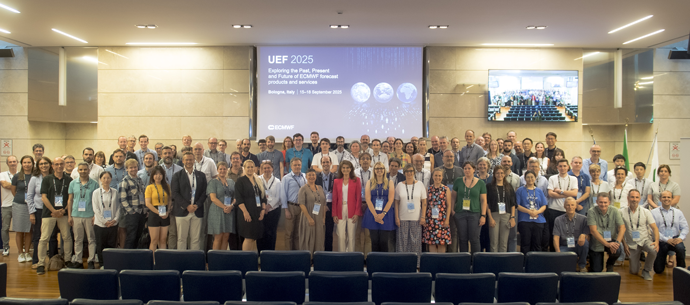
Part of ECMWF's 50th anniversary celebrations in Bologna
As part of the 50th anniversary celebrations of ECMWF, the annual Using ECMWF's Forecasts (UEF2025) event took place in the historic city of Bologna, at the Regione Emilia Romagna and the Tecnopolo di Bologna – ECMWF’s purpose-built data centre hosting our supercomputing facility.
“Using ECMWF’s Forecasts” is a forum for ECMWF forecast users to exchange ideas, share experiences, and discuss the use and performance of ECMWF's forecasts and related products to ensure ECMWF’s forecasts continue to meet user needs. It is open to all ECMWF forecast users around the world and provides an opportunity to give feedback on ECMWF forecast performance and available products and services, stay informed about ECMWF’s latest updates and plans, and connect with ECMWF and fellow users to share experiences and network.
Location
UEF2025 took place in two Bologna venues:
Regione Emilia Romagna · Viale della Fiera, 8, 40127 Bologna BO, Italy
Tecnopolo Data Manifattura Emilia-Romagna, Via Stalingrado 84/3, 40128 Bologna
2025 theme: Exploring the Past, Present and Future of ECMWF forecast products and services
As ECMWF celebrates its 50th anniversary, UEF2025 explored the evolution of ECMWF forecast products and services over the years and into the future. Over the decades, improvements in numerical weather prediction (NWP), forecast products, and services across meteorology, hydrology, air quality, and climate - including extreme event prediction - have supported Member and Co-operating States and the meteorological communities' ability to forecast and respond to weather and its impacts.
Collaboration with Member and Co-operating States has been key to achieving ECMWF's goals, the valuable input, ideas and expertise driving its progress and success. Throughout this journey, ECMWF has remained committed to supporting users to make the most of its products and services through training, documentation, and dedicated support. By understanding user needs, ECMWF continues to design its products and services with a strong focus on usability and impact.
ECMWF ran its first operational medium-range forecast in 1979, its first operational ensemble predictions in 1992 and its first reanalysis (ERA-15) in 1993. To support these, a range of products and tools have been developed, including forecast products like the Extreme Forecast Index (EFI), verification scores to monitor progress, datasets like ERA5, and services such as ecCharts, training courses, and Jupyter Notebooks. These efforts, commonly in collaboration with National Meteorological Services of Member and Co-operating States, have helped to deliver maximum value to society. ECMWF's role in environmental services started in 2015 with the signing of the Copernicus agreement for ECMWF to deliver the Copernicus Atmosphere Monitoring Service (CAMS) and the Copernicus Climate Change Service (C3S) and support the Copernicus Emergency Management Service (CEMS). This was followed in 2022 with the launch of Destination Earth (DestinE), further advancing ECMWF’s contributions to environmental prediction for extremes and climate.
Presently, machine learning is a key component of ECMWF's work. A key milestone of this was the release of AIFS Single, ECMWF's first operational machine learning model, on 25 February 2025. Work continues not only on the machine-learning-based models themselves but also their evaluation compared to traditional NWP. Other exciting developments include ECMWF's Open Data strategy, facilitating more forecast data availability to the whole community. New products such as simulated satellite imagery, visibility meteograms and severe convection forecast products have recently been released with many existing products and services undergoing development and upgrades, often in collaboration with Member and Co-operating State National Meteorological Services.
Looking to the future, the ECMWF 2025-2034 Strategy was released in February 2025, placing strong emphasis on impact and aiming to optimise, enhance and deliver world-leading quality products to meet users' needs through improved science and technology. A key priority remains ensuring that forecasts are not only accurate but also understandable and able to be effectively communicated to users across various sectors.
